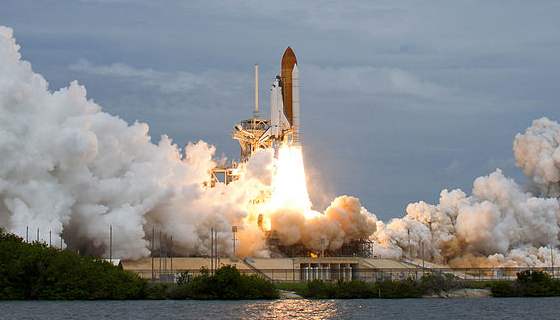- MENU
- HOME
- SEARCH
- WORLD
- MAIN
- AFRICA
- ASIA
- BALKANS
- EUROPE
- LATIN AMERICA
- MIDDLE EAST
- United Kingdom
- United States
- Argentina
- Australia
- Austria
- Benelux
- Brazil
- Canada
- China
- France
- Germany
- Greece
- Hungary
- India
- Indonesia
- Ireland
- Israel
- Italy
- Japan
- Korea
- Mexico
- New Zealand
- Pakistan
- Philippines
- Poland
- Russia
- South Africa
- Spain
- Taiwan
- Turkey
- USA
- BUSINESS
- WEALTH
- STOCKS
- TECH
- HEALTH
- LIFESTYLE
- ENTERTAINMENT
- SPORTS
- RSS
- iHaveNet.com
Mitch Albom

Space Shuttle Atlantis Final Launch (Photo Credit: NASA)
I built one model as a kid. It wasn't a boat. It wasn't a car. It was a spaceship.
In those days, nothing could fascinate a boy like a long, tall rocket. Mine was the Apollo 11, with its huge thrusters at the bottom and, at the top, the hidden lunar module -- the bug-like vehicle that would land on the moon.
I lined up all the pieces. Used ample glue. It took hours. At the very end, as the instructions indicated, I peeled back the American flag decal and stuck it on the side.
I thought about that flag and that model, as the space shuttle Atlantis, after three decades and more than 130 shuttle flights, made its final launch. After this, the U.S. space program will sit on the bench for a while, giving way to private industry or -- impossible as this may sound -- sharing rides with the Russians.
"Does it bother me?" shuttle commander Christopher Ferguson told the media. "I think the transition could have taken place more gradually....
"I do think we are kind of hanging it out a little bit. But ... we have our Russian partners. They'll get us up and down. We're paying customers."
Paying customers?
Well, yes. As with so many other things the government once did, our space program is moving more to the private sector. You can buy a trip to the stars now. Richard Branson, the British billionaire behind
Or you can pay the Russians. That's what our government is doing. Instead of launching a rocket from
Do we have to sit in back with the dog?
President George W. Bush put the first nail in the space shuttle coffin; President Barrack Obama hammered in another -- deciding Bush's proposed alternative to the shuttle, the Constellation moon program, was too expensive. Obama has suggested a "flexible path" approach which, when you listen to it, sounds flexible enough to include going nowhere for a long time.
In short, for space fans, the fun's over for a while.
Does this sadden you? It does me. I'm not saying every dollar we spent over the years with
There was once a national pride in how far we Americans could go in space. We are the best dreamers on the planet, and the Gemini and Apollo programs reflected that. Over the years, the cries of "Take care of life down here!" grew louder. We became jaded toward space, as movies and video games made it seem like something we could go to anytime, in HD.
But computer graphics are one thing. Launching a real rocket hundreds of miles into the sky is something else. It's OK for a nation to take pride in that and yes, to fund it, the way governments once funded the exploration of this planet -- Magellan, Christopher Columbus, etc.
Instead, an American kid today can build a model rocket and then proudly stick a Virgin decal on the side. Or a Russian flag. The common phrase is "reach for the stars." But with the end of the space shuttle, it's more like "hail a cab."
Available at Amazon.com:
Hot Time in the Old Town: The Great Heat Wave of 1896 and the Making of Theodore Roosevelt
American Insurgents, American Patriots: The Revolution of the People
Broke, USA: From Pawnshops to Poverty, Inc.How the Working Poor Became Big Business
Were You Born on the Wrong Continent?: How the European Model Can Help You Get a Life
The Disappearing Center: Engaged Citizens, Polarization, and American Democracy
The Virtues of Mendacity: On Lying in Politics
Bush on the Home Front: Domestic Policy Triumphs and Setbacks
The Political Fix: Changing the Game of American Democracy, from the Grassroots to the White House
Courage Grows Strong at the Wound
WORLD | AFRICA | ASIA | EUROPE | LATIN AMERICA | MIDDLE EAST | UNITED STATES | ECONOMICS | EDUCATION | ENVIRONMENT | FOREIGN POLICY | POLITICS
Has America Stopped Reaching for the Stars?